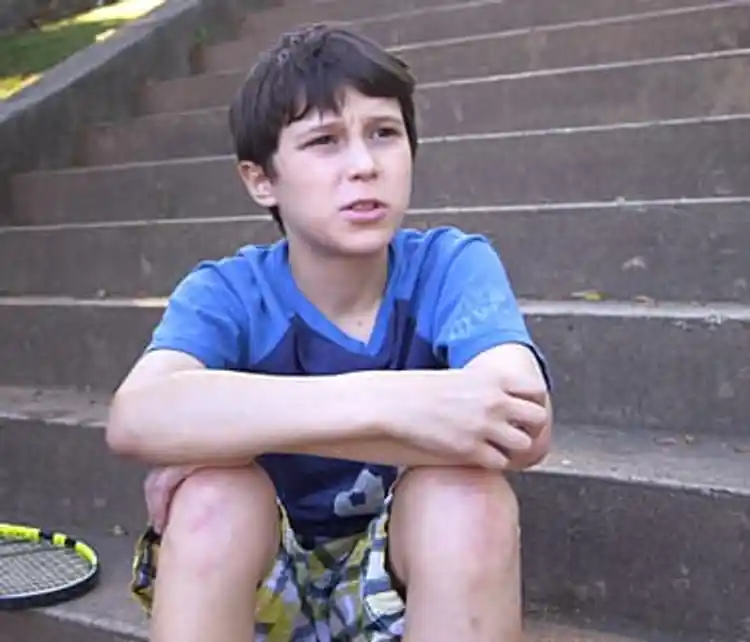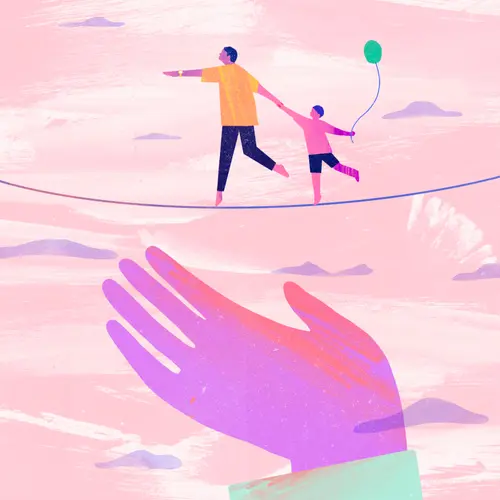Helping Your Child Live With Eczema

Hide Video Transcript
Video Transcript
INTERVIEWER
13-year-old Drew Thomason lives in the ideal environment for managing his eczema. Mom Cynthia Abbott is a dermatologist. CYNTHIA ABBOTT
Hopefully, he's up there, and he's showering, and he's taking a short, tepid shower. If you have eczema, you're supposed to do short, tepid showers, and not long, hot showers, which is basically denuding the entire skin of all of the natural oils that they have. INTERVIEWER
Drew's eczema appeared when he was a baby. Cynthia used the same advice she gives her patients. CYNTHIA ABBOTT
The main thing is, you need to find an unscented, bland, plain moisturizer. Get them covered in cream. And then the worst areas, you would use either an oil or a cream that has some kind of steroid in it. Very low dose. And you clip their fingernails really short. You can put socks over their hands so they won't scratch so much. INTERVIEWER
As children grow, she recommends teaching them to apply their creams and medications, and how to identify and avoid their personal triggers. In Drew's case, it's often his allergies. CYNTHIA ABBOTT
He knows what flares his eczema. DREW THOMASON
Grass, dust mite poop, horses, dyes, and deodorant, and pollen. INTERVIEWER
Sunscreen and sweat are also common triggers. CYNTHIA ABBOTT
Sweat irritates his skin, so after he gets done from playing tennis, he knows he's supposed to take a shower. INTERVIEWER
It's a lot for children to remember. CYNTHIA ABBOTT
And he has to think about all this, which is just a pain. So he doesn't like it. Sometimes he'll rebel, and he'll decide that he's no different than anybody else, and then he'll become a mess. Drew. How come you're not taking a shower? DREW THOMASON
Ugh. CYNTHIA ABBOTT
You're sweaty. You've got sunscreen on. DREW THOMASON
No I'm not. CYNTHIA ABBOTT
Right? DREW THOMASON
I feel fine. CYNTHIA ABBOTT
You feel fine. Sometimes he's gotten so bad on the back of his legs, which he'll hide with jeans so I don't see them. And then I do see them, and I freak out, because he's bleeding. You know, because he's scratched so much. He doesn't want to show me, because he doesn't want to hear the lectures and he doesn't want to get started on all his creams again. Seriously. Can you go up and take your shower now?
Parents have a lot of guilt if the child ends up with a rash, or you let this happen to the child.
Thanks, Drew.
I want to relay to them, I understand how you feel. As your child gets older, you have to give them the responsibility, and if they don't want to take it, their rash is going to be bad, and those are normal consequences. How far do you let those normal consequences go before you have to jump in and rescue them, and how much guilt do you feel because you're not jumping in, and helicoptering, and fixing it?
I don't hear any shower. I'd say let the guilt go and just try and do your best. And you've got to know, when it gets really bad, that you're going to have to jump in and rescue them.
You're out. OK, good. Just checking. Hope you're putting your creams on.
And you have to keep jumping in, and keep jumping in, but hopefully, it'll be less and less. And if they're really good for a week, then the rash is going to go away. Your job is to make sure that it doesn't get infected. And try and emphasize to the child that they're going to have to learn to take care of themselves.
So you got all the creams on, right? Yeah. Little greasy. Good job.
